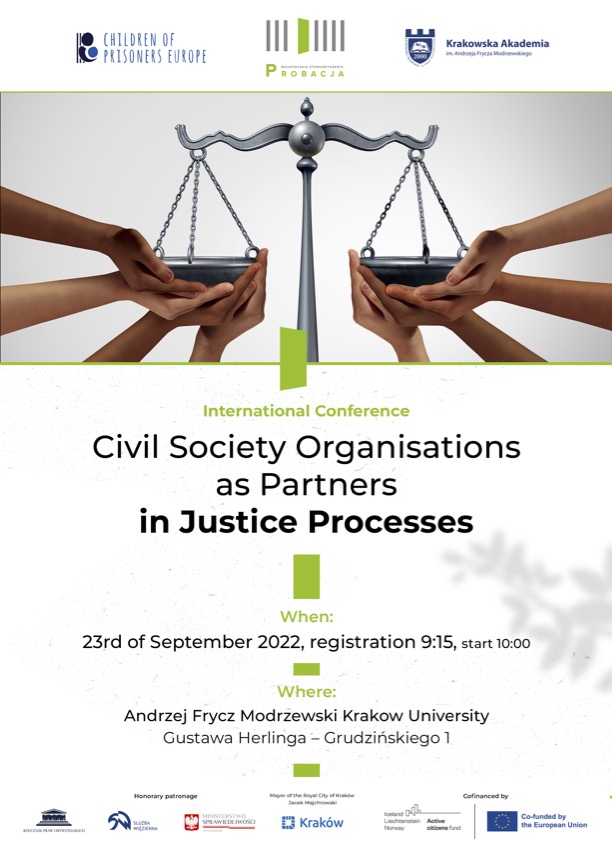Krakow, Poland 22-23 September
‘The purpose of emphasising the duty of the sentencing court to acknowledge the interests of the children […] is not to permit errant parents unreasonably to avoid appropriate punishment. Rather, it is to protect the innocent children as much as is reasonably possible in the circumstances from avoidable harm’.
— Justice Albie Sachs,
from his 2007 judgement on the S v M case (South Africa)
COPE is organising a roundtable for judges and magistrates to coincide with an international conference on judicial processes organised by Probacja Foundation Poland and Andrzej Frycz Modrzewski Krakow Academy, to be held in Krakow on 22-23 September. The roundtable will take place on 22 September, prior to the conference, and will be chaired by COPE President Rachel Brett. Overarching objectives of the roundtable beyond the cross-fertilisation of ideas include laying down some overall guidelines for sentencers that can be woven into the intricacies of different jurisdictions, and identifying best practices.
The conference organised by Probacja Association on 23 September, “Civil Society Organisations as Partners in Justice Processes” will consider the realities of organisations working to support children with imprisoned parents and how to maintain the best interests of children during the sentencing of a parent. The conference has been organised for the 20th anniversary of the Probacja Association, a leading organisation in the implementation of re-socialisation projects for those in conflict with the law as well as crime prevention. The conference is supported by the Minister of Justice, the Ombudsman, the Director General of the Prison Service and the Mayor of the City of Krakow. Find the agenda here:
Background
COPE is currently working within the European context to better protect the rights and best interests of children when a parent is in conflict with the law, to ensure that children are heard and to promote the use of prison as a measure of last resort in light of the adverse impact of a parent’s incarceration on children.
The Council of the European Union recently adopted Conclusions to the EU Strategy on the Rights of the Child that bolster COPE’s work. These Conclusions call for “Strengthening the Member States’ justice systems, so that they are compliant with the rights of all children, in particular by, among others:
- Ensuring that the best interests of the child is a primary consideration in all judicial proceedings relating to children,
- Developing child-friendly proceedings from the very beginning, including through the provision of age-appropriate and child friendly information and possible ways of participation,
- Ensuring, the fulfilment of the right of the child to be heard in proceedings affecting the child, either directly, or through a representative or an appropriate body in a manner consistent with the procedural rules of national law and with EU acquis,
- Ensuring, that the right of the child to respect for his or her private life is protected in the best possible way during proceedings,
- Ensuring that proceedings in cases involving children are handled without undue delay and that the decisions reached in these proceedings are systematically enforced in compliance with the existing EU legal framework and other relevant international legal means in order to ensure effective implementation of the rights of the child in compliance with the principle of subsidiarity,
- Providing the necessary support services to children during, and also after, the proceedings, for as long as the children need them,
- Promoting inter-disciplinary cooperation among different services to support the child in the best possible way before, during and after proceedings.
COPE is taking a holistic, cross-spectrum child-rights approach to working with judges and magistrates at all stages — when issuing arrest warrants; when deciding on pre-trial/during trial; when reviewing conditions for ongoing child-parent contact (cf COPE /AIRE Centre amicus brief to European Court of Human Rights on Deltuva v Lithuania), when sentencing (including what kind of non-custodial measures not only prison or not), and during a parent’s release from prison — temporary or permanent and any ongoing restrictions. Integral to COPE’s approach is exploring the question: How can we find ways to give children a right to be heard when a judge is deciding about the imprisonment of their parent?


